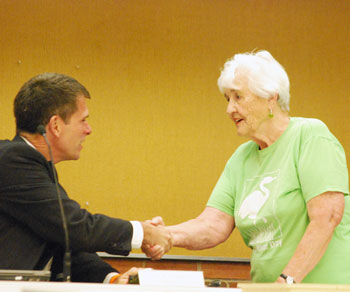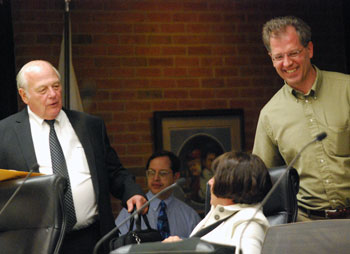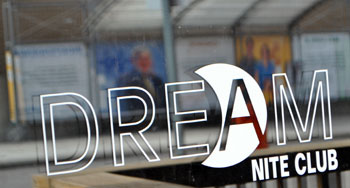Sustainability Permeates Council Meeting
Ann Arbor city council meeting (July 2, 2012): The council’s agenda was relatively light, consisting of several apparently unrelated items. But for some agenda items, “sustainability” was a common theme.

Eunice Burns, former Ann Arbor city councilmember and Downtown Development Authority board member, introduces herself to city administrator Steve Powers before the July 2 council meeting started. Burns was on hand to receive a proclamation for Huron River Day, which falls on July 15 this year. Burns, along with Shirley Axon, is co-founder of the event. (Photos by the writer.)
Most obviously fitting that theme was a resolution passed by the council directing the city’s planning commission to incorporate 16 sustainability goals into the city’s master plan. The 16 goals, which were compiled from existing planning documents, had worked their way through a community engagement process and were adopted by several city commissions before arriving before the city council. The goals fall into four categories: climate and energy; community; land use and access; and resource management.
Clearly related to land use and access (the goal of “preserve our natural systems”), as well as resource management (“eliminate pollutants in our air and water systems”) was a resolution directing city staff to develop a “green streets” policy. The policy would formalize an approach to stormwater management that would allow city street projects to incorporate various technologies to mimic natural processes, to reduce the amount of stormwater runoff that goes directly into the city’s stormwater pipes and on into the Huron River. Features like bioswales, for example, would filter stormwater through natural systems so that pollutants from street surfaces would not flow directly to the river.
The river itself was part of the meeting’s sustainability theme as it was highlighted with a mayoral proclamation in honor of Huron River Day, which falls on July 15 this year.
Among the specific sustainability goals in the category of “community” is one that addresses economic sustainability: “Develop a prosperous, resilient local economy that provides opportunity by … rewarding investment in our community …” In that spirit, the council took the first step toward awarding a tax abatement to Barracuda Networks, a company that recently announced it’s moving from its Depot Street location into downtown Ann Arbor as part of a planned expansion of its workforce.
Another agenda item could be analyzed as part of the “integrated land use” and “economic vitality” sustainability goals: final approval of a rezoning request for the Shell station on the northeast corner of Ann Arbor-Saline and West Eisenhower Parkway.
Fitting into the “community” sustainability category was a resolution that made Ann Arbor a member of the Washtenaw Health Initiative (WHI) by authorizing a $10,000 annual membership fee. The goal of the WHI is to help local health care providers handle an influx of an estimated 50,000 newly insured patients when federal health care reforms take effect in 2014. The specific sustainability goal is to “provide services that meet basic human needs of impoverished and disenfranchised residents to maximize the health and well-being of the community.”
The council also approved appointments to three city commissions that are connected thematically to the sustainability goals – environmental, greenbelt advisory, and planning.
Making the city of Ann Arbor more financially sustainable is not an explicit part of the sustainability goals adopted by the city council. Yet financial sustainability could be seen as an outcome of the council’s ratification of three different union contracts. All three contracts increase the retirement benefit vesting period for new hires from five to 10 years, and increase the period for the final average compensation calculation to five years from three. The three labor groups that had their contracts ratified were the police professional assistants, civilian supervisors, and the deputy police chiefs.
Some of the public commentary also featured a sustainability theme – as former Allied Bendix engineer Kermit Schlansker outlined the energy efficiency benefits of cisterns. Also weighing in during public commentary were opponents of the new “smart meters” that are being installed by DTE Energy in Ann Arbor and other Michigan communities.
In other business, the council approved a weapons screening contract with the Washtenaw County sheriff’s office – for the 15th District Court, located inside the new justice center along with the Ann Arbor police department.
During communications time, city attorney Stephen Postema updated the council on legal action related to the Dream Nite Club, which had its liquor license revoked earlier this year. He said four significant court rulings on lawsuits filed by the club’s owners against the city had gone the city’s way.
The council’s communications also included mention of two ballot questions that voters might have to decide in November. One is a renewal of the park maintenance and capital improvements millage. The council is almost certain to place that millage renewal on the Nov. 6 ballot. Another question is less certain – one that would change the city charter to require a voter referendum, if the city were to lease parkland. The charter already prohibits the sale of parkland without a referendum. [Full Story]





